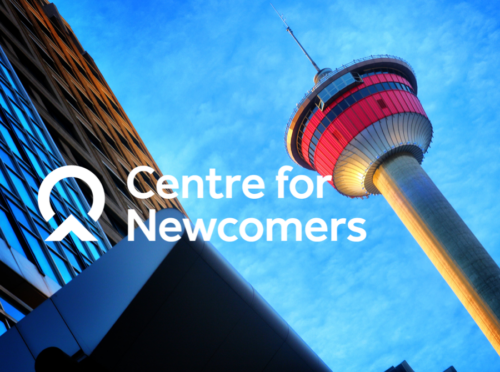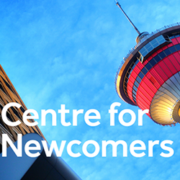Calgary gang intervention program empowers new to Canada youth through quality sport, mentorship

You can’t over-emphasize the power of having a good coach.
As far as Noël Bahliby is concerned, having a positive role model in a child’s life is crucial to their sense of well-being and self-worth. And as the Director of Youth Programs for the Centre for Newcomers in Calgary, he knows that offering newcomers to Canada the opportunity to get involved with a quality sport team and providing them with one-on-one instruction is one of the most powerful ways to keep them on a positive trajectory as they acclimatize to their new country.
That’s why the Centre for Newcomers offers the Real ME program, which has a multi-pronged approach to keeping at-risk youth engaged, healthy and away from negative influences such as gangs. That includes involvement in prosocial activities like recreational and competitive sports, which removes barriers to accessing community organizations and provides opportunities for positive relationship-building. It’s one way the organization is addressing Canada’s systemic issues since immigrants and refugees began arriving in large numbers in recent years, leading to problems such as the over-representation of racialized youth in custody.
“Having an opportunity like sport, where you have this positive role model who is keeping you accountable and checking in on you, can have such a massive impact for at-risk youth because then it’s somebody there in their life that’s concrete and consistent. These participants are not really getting that anywhere else,” he said, following a presentation at the 2023 Sport for Life Summit in Calgary on the Real ME program.
“Obviously it can be tied to their performance in sports, but then also being on a bigger team and being part of a community can be very gratifying and can help bring peace to the youth mentally.”
The program is an intervention program for first- and second-generation newcomer immigrant youth that are considered high risk for gang or criminal involvement. It’s an identity-based wraparound intervention–wraparound being a social work term rooted in the concept that it takes a village to raise a child. The Centre for Newcomers has had an ongoing waitlist for the Real ME program for multiple years now, with about half of their participants coming from school referrals and half coming from the justice system.
“There’s a disproportionate amount of racialized youth in the justice system right now and in particular it’s the children of immigrants. If you go to the juvie right now, there’s something like 70 per cent of the population that are Afro-Caribbean or Black kids. And they’re almost all the children of people that have recently moved to Canada,” he said.
“So it’s really about recognizing that there’s something going on in that first five years of the settlement process.”
Supporting vulnerable youth
When Bahliby was invited to speak at the Calgary Summit, he did research into the current reality of the sport system in Canada. What he found fascinated him.
“Going through and doing that literature review and really finding that evidence was very validating, and then getting to meet people that work in all different aspects of the sport system, whether it’s accessible sports, or sports that traditionally immigrant youth wouldn’t be partaking in, and hearing how they view their sports as being more welcoming to that demographic, was a really powerful experience,” he said.
“And then I saw how much energy and excitement there is, because I think a lot of people understand that when it’s done well sport can really have a multi-layered impact on both the mental health and well-being of people, whether it’s their physical health or their emotional state. For New to Canada participants, there’s the opportunity to make friends through sport and even though you meet people through school and other settings I think that’s one of the most underrated pieces about being engaged in sports.”
And over and over again, he heard about the importance of finding a reliable coach, or mentor.
“That’s something that’s really lacking for many of the people we work with, a solid parent. They don’t have people who are fully available to support them. When it comes to the immigration context, it’s not always that the parents are neglectful. More often it’s that they’re working odd hours, and often more than one job. They’re struggling to secure housing and learning English to increase their employability, and aren’t necessarily home in the evenings.”
This puts their participants in a tough spot.
“Our participants are looking for belonging, for somebody to guide them, and it’s in that state of vulnerability when those negative characters come in. The gang recruiters don’t go for the kids that are well-mannered and have a great support system – they go for the kids that are really struggling. Nobody’s looking after them,” he said.
Once the kids get entrenched in the criminal culture, it’s difficult to reach them further. Regardless, the Real Me program remains committed to supporting them.
“We do counseling support, and we can get them one-on-one counseling. We pay for anger management training and other courses, especially court-mandated ones, and then during the pandemic we opened up the counseling to parents as well and found a lot of trauma was present. We do pro-social support so we can pay for sports, for recreational arts, equipment fees. And we do mentorship, in the style of Big Brothers & Big Sisters,” he said.
Third Culture kids
Real ME is only one of the programs offered by the Centre for Newcomers, which grew out of a pilot project in 2014 started by University of Calgary’s Department of Social Work, and then fully joined the Centre for Newcomers in 2018,
Bahliby believes they’ve accomplished a lot since then, but there’s no shortage of work to be done – partly because their mandate continues to expand, and partly because the need continues to grow. Issues like lack of appropriate transportation and the housing crisis continue to put the families they work with in a pinch, exacerbating the social issues they’re grappling with.
“There’s a term we use, which is Third Culture kids. You’re not quite Canadian, but you’re not quite your parents’ culture because you’re kind of in the middle there.”
One of the Centre’s primary objectives is making the participants feel safe and empowered.
“Mentors can just come in and focus on giving your attention to this young person’, and once that relationship is built you can go out into the community, go see a movie together. We’ll give them movie passes. For some of the kids it’s their first time going to a theatre, or their first time going Go-Karting or mini-golfing, so it’s fun for the kids and rewarding for the mentors,” he said.
“A lot of our mentors are about 21 to 25, so what we try to do is recruit fresh out of university because you want someone who can speak to their experiences. Even getting university graduates is ideal, because they can say ‘I did it, look at me. I graduated, so can you.’”
For more information about the Real ME program, visit centrefornewcomers.ca.

